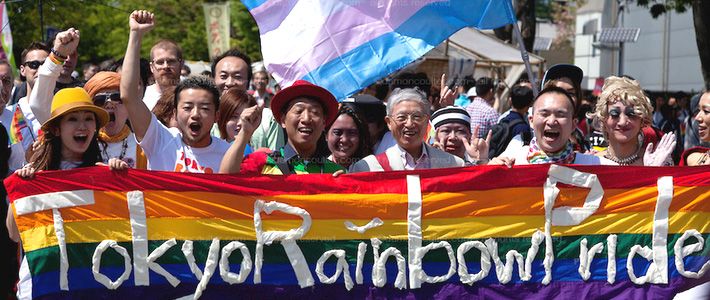
Signs of Growing Acceptance for Japan’s Gay Community
Politics Society- English
- 日本語
- 简体字
- 繁體字
- Français
- Español
- العربية
- Русский
In what is seen by some as a landmark ruling for Japan’s LGBT community, the city government of Shibuya, Tokyo, last week outlined plans to issue same-sex couples with a certificate recognizing their relationship as being “equivalent to marriage.”
Landmark Proposals
The draft statute—now awaiting approval by the Shibuya Municipal assembly, scheduled to convene in March—was unveiled on February 12 as part of the district’s budget for fiscal 2015. If ratified, the new legislation will come into effect on April 1, with the issuance of certificates likely to follow later in the year.
With the neighboring city of Setagaya also considering a similar measure, there are hopes among LGBT advocates that this may represent a vital first step toward marriage equality, though in Shibuya’s case the proposed documents—provisionally entitled pātonāshippu shōmei (partnership certificates)—will not be legally binding. Officials have stressed that they represent “a completely separate system” from marriage. Indeed, most of the tax and other benefits associated with marriage are decided at the national level, meaning that a municipal step like this is largely for show.
Less than a week after Shibuya’s announcement, Prime Minister Abe Shinzō seemed to quash any idea that nationwide reforms might be in the works in the near future. In response to questions in the House of Representatives on February 18, Abe remarked that the issue of legal recognition for same-sex couples was not addressed under the current Constitution. (Article 24 begins: “Marriage shall be based only on the mutual consent of both sexes and it shall be maintained through mutual cooperation with the equal rights of husband and wife as a basis.”) Although the prime minister has shown himself to be willing to alter the nation’s basic law, he remained cautious in this case: “The issue of whether or not to reform the constitution to allow same-sex marriage is one with fundamental implications for the place of the family in our society, and so requires extremely careful examination.”
Nonetheless, the Shibuya authorities are expected to urge local residents and businesses to afford same-sex couples the same treatment they would a heterosexual partnership. Coming as it does in such a prominent municipality, this move is sure to draw attention to other LGBT issues. It is also hoped that the documentation will be of use to same-sex couples who have hitherto faced discrimination when seeking an apartment together, trying to adopt children, visiting a sick partner in the hospital, or receiving fair treatment in the event of a companion’s death.
Lack of Understanding
Although overt prejudice against sexual minorities is comparatively rare in Japan, there is a lack of official legislation aimed at curbing discrimination in fields like employment, education, healthcare, and banking. Mainstream media coverage of LGBT issues also remains scant. While there are many openly gay celebrities, they tend to be rather fabulous, larger-than-life characters, with particularly strong representation for the transgender community. Mainstream gay culture finds itself airbrushed out of the picture and largely misunderstood.
Public opinion, too, appears to be lagging when it comes to respect for relationship equality. A March 2014 opinion poll found that while 74.6% of respondents think society is “either unkind or somewhat unkind to sexual minorities,” this translates into only 42.3% support for the idea of recognizing same-sex unions. Answers from the 20–30 age group do, though, sound a note of positivity, with 70% in favor of official endorsement for such marriages.
With this in mind, the new proposals represent a move in the right direction. Shibuya mayor Kuwahara Toshitake is quoted as saying that the aim is “the creation of a diverse society, where differences are accepted.” This follows a 2013 move by Osaka’s Yodogawa Ward to promote awareness of gay issues through measures including diversity training and regular discourse with the local LGBT community.
Public Figures
First lady Abe Akie has also lifted her voice in support of Japan’s gay population. She appeared at the Tokyo Rainbow parade in April 2014, later writing on her personal Facebook account of her desire to “help build a society where anyone can conduct happy, enriched lives without facing discrimination." The prime minister’s wife has also thrown her weight behind the activities of a joint commission established by UNAIDS (the United Nations Programme on HIV/AIDS) and leading medical journal The Lancet.
Not all high-profile figures have painted themselves in such an egalitarian light, however. In 2010, former Tokyo Governor Ishihara Shintarō made waves when he described homosexuality as a “genetic defect.”
But still, tolerance and awareness seem to be spreading. Last year, video-game giant Nintendo confirmed that it would not include an option to create homosexual couples in its popular Tomodachi Life simulation game, but softened the blow with a conciliatory statement: “We pledge that if we create a next installment in the Tomodachi series, we will strive to design a game-play experience from the ground up that is more inclusive, and better represents all players.”
And on the romantic front, even if legal married status continues to elude gay couples, a variety of locations, including Tokyo Disneyland and Kyoto’s sixteenth-century Zen Buddhist temple Shunkōin, are offering everyone, regardless of sexuality, the opportunity to enjoy a happy, memorable wedding day.
(Banner photo: Rainbow Pride parade participants march in Tokyo’s Yoyogi Park on April 27, 2014. © Damon Coulter.)
equality diversity homosexuality marriage rights gay LGBT Rowing